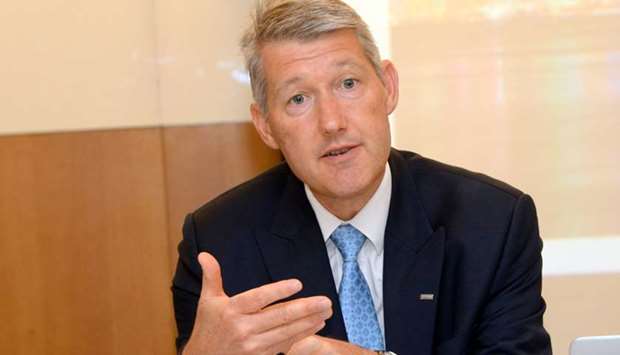Digitalisation and smart infrastructure are key to helping cities like Doha provide a “high quality of life, prepare for future challenges, and offer an environment that encourages economic growth”, says Siemens Qatar CEO Adrian Wood.
Siemens, he said, is currently collaborating with a number of customers to promote smart buildings in Qatar through the development of a pilot project focusing on the implementation of Siemens’ ‘Navigator’ technology.
Analytical building performance tools from Siemens – ‘Navigator’ and ‘Demand Flow’ – are able to identify energy and water savings of up to 30%, he said at a media roundtable on Sunday.
Digitalisation can help the infrastructure to drive economic development in areas such as smart manufacturing, he noted.
But this needs to happen while also ensuring the conservation and protection of resources such as energy, clean water, and clean air. This is especially important for ambitious cities in growth mode like Doha that are looking to continually improve and expand services and enhance infrastructure.
Siemens calls this approach “City 4.0,” Wood said.
This approach will be a key driver of the society and the economy in Qatar by helping cities leverage the benefits of digitalisation to improve efficiency and optimise the underlying infrastructure layer. This means city services and resources are always available to those who need them.
“An intelligent city must be designed around the needs of its people and its resources. This means using data and analytics to enhance quality of life, strengthen society and make cities safer and more livable,” said Wood.
“Cities like Doha are already generating data, and the next step is turning big data into smart data. For this we need connectivity – the Internet of Things (IoT),” Wood said.
Siemens believes future cities will run on operating systems, collecting and analysing data from city infrastructure to make intelligent decisions, Wood said.
Information from buildings, traffic management, power plants, transport networks and even weather forecasts can be integrated and analysed to improve sustainability and quality of life.
“When it comes to cities, we implement smart technologies and digitalisation to address issues such as urban traffic, water and energy consumption, and city services optimisation. Ultimately, we recognise that cities are complex webs of people, systems and infrastructure,” Wood said.
Cities are central to addressing climate change, as their traffic, industry, and energy needs already account for up to 70% of global greenhouse gas emissions. This creates an opportunity for cities such as Doha to embrace digitalisation to reduce environmental impact in these areas, he noted and added that more than 200 buildings in Qatar have been equipped with "55,000 sensors and 1mn data points" to make infrastructure safe, comfortable and efficient.
Wood also said Siemens, which employs nearly 550 people in the country, contributed QR5bn to Qatar's economy, directly, indirectly and through induced gross value addition (GVA).
Analytical building performance tools from Siemens – ‘Navigator’ and ‘Demand Flow’ – are able to identify energy and water savings of up to 30%, he said at a media roundtable on Sunday.
Digitalisation can help the infrastructure to drive economic development in areas such as smart manufacturing, he noted.
But this needs to happen while also ensuring the conservation and protection of resources such as energy, clean water, and clean air. This is especially important for ambitious cities in growth mode like Doha that are looking to continually improve and expand services and enhance infrastructure.
Siemens calls this approach “City 4.0,” Wood said.
This approach will be a key driver of the society and the economy in Qatar by helping cities leverage the benefits of digitalisation to improve efficiency and optimise the underlying infrastructure layer. This means city services and resources are always available to those who need them.
“An intelligent city must be designed around the needs of its people and its resources. This means using data and analytics to enhance quality of life, strengthen society and make cities safer and more livable,” said Wood.
“Cities like Doha are already generating data, and the next step is turning big data into smart data. For this we need connectivity – the Internet of Things (IoT),” Wood said.
Siemens believes future cities will run on operating systems, collecting and analysing data from city infrastructure to make intelligent decisions, Wood said.
Information from buildings, traffic management, power plants, transport networks and even weather forecasts can be integrated and analysed to improve sustainability and quality of life.
“When it comes to cities, we implement smart technologies and digitalisation to address issues such as urban traffic, water and energy consumption, and city services optimisation. Ultimately, we recognise that cities are complex webs of people, systems and infrastructure,” Wood said.
Cities are central to addressing climate change, as their traffic, industry, and energy needs already account for up to 70% of global greenhouse gas emissions. This creates an opportunity for cities such as Doha to embrace digitalisation to reduce environmental impact in these areas, he noted and added that more than 200 buildings in Qatar have been equipped with "55,000 sensors and 1mn data points" to make infrastructure safe, comfortable and efficient.
Wood also said Siemens, which employs nearly 550 people in the country, contributed QR5bn to Qatar's economy, directly, indirectly and through induced gross value addition (GVA).


